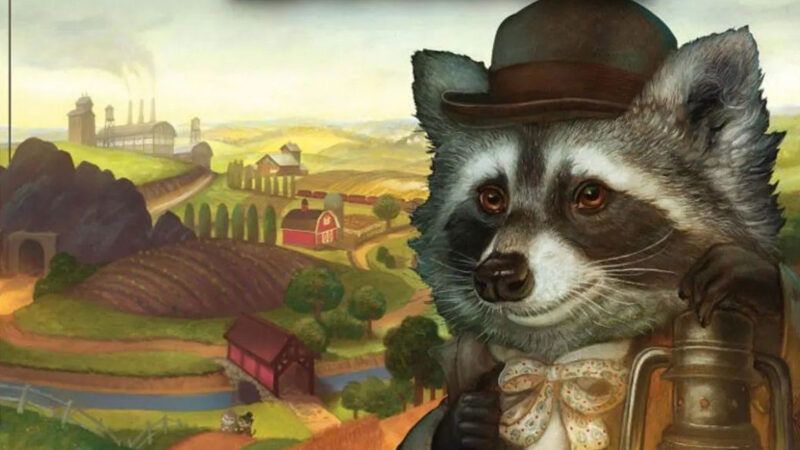Review: Raccoon Tycoon
Unlike in Catan, the value of your wheat, wood, iron, coal, manufactured goods, and luxuries will fluctuate depending on what has recently been bought and sold in the game's marketplace.

If you've ever thought that what Settlers of Catan really needs is a more robust market mechanism and a heavier emphasis on industry rather than pastoral utopia, Raccoon Tycoon has you covered.
Would-be tycoons in this board game attempt to fuel an adorable woodland industrial revolution by initially building up piles of resources. Unlike in Catan, the value of your wheat, wood, iron, coal, manufactured goods, and luxuries will fluctuate depending on what has recently been bought and sold in the game's marketplace.
See that an opponent is stacking up a big pile of coal? You can tank his potential profits by selling your own coal supplies, lowering the price he'll receive (or forcing him to wait to sell until prices recover). Did wheat just hit a new record high? The market is telling you to sell, sell, sell!
But this isn't just about resource gathering. After all, what good are coal and iron if they can't be turned into factories, towns, and railroads? To win, players must navigate the commodities market, trade goods for cash, and then use the cash to build the most prodigious industrial empire.
Editor's Note: As of February 29, 2024, commenting privileges on reason.com posts are limited to Reason Plus subscribers. Past commenters are grandfathered in for a temporary period. Subscribe here to preserve your ability to comment. Your Reason Plus subscription also gives you an ad-free version of reason.com, along with full access to the digital edition and archives of Reason magazine. We request that comments be civil and on-topic. We do not moderate or assume any responsibility for comments, which are owned by the readers who post them. Comments do not represent the views of reason.com or Reason Foundation. We reserve the right to delete any comment and ban commenters for any reason at any time. Comments may only be edited within 5 minutes of posting. Report abuses.
Please to post comments


I have this in my house, except it's the mice.
I'm in. I've actually spent a lot of time using some good board games to demonstrate key economic concepts to my kids. A simplified model of supply and demand would be helpful.
For example, "Ra" is a great board game because everyone starts off with different conditions and turns. As a result, there is no "Optimal Move" in the game. Everyone, depending on their priors, has their own best moves. It was really eye opening for my kids who are inculcated from birth with the notion that Top Men can identify the Best Path for anyone.
Acquire is a great view of coop-etition, and usually (depending on the players) is a very clear way of showing Net Present Value. Most games play on opportunity cost, but Acquire illustrates it first because it uses money and equities, and shows how it can be bad to have money locked in an asset- even if it is growing- rather than liquid and available right now to jump in a new opportunity. Acquire also neatly demonstrates how having "unique information" can be a differentiator in business.
None of these games can model the complete economy, of course. And you need to warn kids from over-simplifying or over-generalizing anything. But these mechanics are also good hooks to teach kids about economics and even history (Gettysburg, Diplomacy). Even Trans America and Ticket to Ride have done more to give my kids relative understanding of cities' location than any geography class.
Sounds dangerously racist and trans/homophobic.
And certainly speciphobic.
Agreed. Much better would be a board game where those who achieve higher (lower?) intersectional scores win by achieving greater oppression based on race, gender, species, and mental fragility. And bonus points for destroying any free market activities and forcing opponents into socialist compliance.
Sounds like a good game. So many "resource planning" games, from tabletop to video completely neglect basic economics. Trading mechanics help, such as in Catan, but not enough.
But is Racoon Tycoon price fluctuation enough? It's still a competitive game that fundamentally teaches a zero-sum economy. How about mechanics for mutually beneficial trade? Comparative advantage leading to specialization?